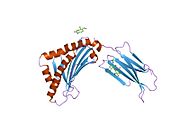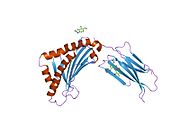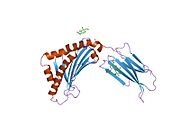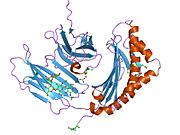
The alpha-1D adrenergic receptor, also known as ADRA1D, is an alpha-1 adrenergic receptor, and also denotes the human gene encoding it.

alpha-2-HS-glycoprotein also known as fetuin-A is a protein that in humans is encoded by the AHSG gene. Fetuin-A belongs to the fetuin class of plasma binding proteins and is more abundant in fetal than adult blood.

Collagen alpha-1(VI) chain is a protein that in humans is encoded by the COL6A1 gene.

Lipoamide acyltransferase component of branched-chain alpha-keto acid dehydrogenase complex, mitochondrial is an enzyme that in humans is encoded by the DBT gene.

Sterile alpha motif and leucine zipper containing kinase AZK, also known as ZAK, is a human gene.

Pregnancy-specific beta-1-glycoprotein 9 is a protein that in humans is encoded by the PSG9 gene.

Beta-1,4-mannosyl-glycoprotein 4-beta-N-acetylglucosaminyltransferase is an enzyme that in humans is encoded by the MGAT3 gene.

Alpha-1,6-mannosylglycoprotein 6-beta-N-acetylglucosaminyltransferase A is an enzyme that in humans is encoded by the MGAT5 gene.

Krueppel-like factor 12 is a protein that in humans is encoded by the KLF12 gene.

Pregnancy-specific beta-1-glycoprotein 3 is a protein that in humans is encoded by the PSG3 gene.

Butyrophilin subfamily 1 member A1 is a protein that in humans is encoded by the BTN1A1 gene.

CMP-N-acetylneuraminate-beta-galactosamide-alpha-2,3-sialyltransferase is an enzyme that in humans is encoded by the ST3GAL4 gene.
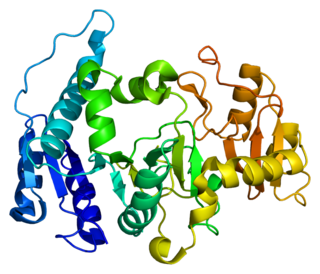
Alpha-1,3-mannosyl-glycoprotein 2-beta-N-acetylglucosaminyltransferase is an enzyme that in humans is encoded by the MGAT1 gene.

Pregnancy-specific beta-1-glycoprotein 4 is a protein that in humans is encoded by the PSG4 gene.

Zinc finger protein 267 is a protein that in humans is encoded by the ZNF267 gene.

Alpha-1-acid glycoprotein 1 is a protein that in humans is encoded by the ORM1 gene.

Zinc finger protein PLAGL2 is a protein that in humans is encoded by the PLAGL2 gene.

Zinc finger protein 23 is a protein that in humans is encoded by the ZNF23 gene.

Zinc finger protein 33A is a protein that in humans is encoded by the ZNF33A gene.

RING finger protein 39 is a protein that in humans is encoded by the RNF39 gene.






















